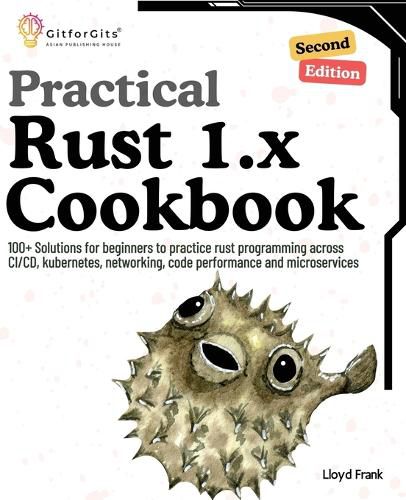Readings Newsletter
Become a Readings Member to make your shopping experience even easier.
Sign in or sign up for free!
You’re not far away from qualifying for FREE standard shipping within Australia
You’ve qualified for FREE standard shipping within Australia
The cart is loading…






This title is printed to order. This book may have been self-published. If so, we cannot guarantee the quality of the content. In the main most books will have gone through the editing process however some may not. We therefore suggest that you be aware of this before ordering this book. If in doubt check either the author or publisher’s details as we are unable to accept any returns unless they are faulty. Please contact us if you have any questions.
If you want to learn how to program in Rust and create strong, reliable apps with the most recent version Rust 1.68, then you need the "Practical Rust 1.x Cookbook (Second Edition)"-a book full of real-world solutions. An extensive collection of practical recipes covering a wide range of topics. You will learn the fundamentals of programming, how to set up a development environment, and the syntax of Rust in the first few chapters. Data structures, pattern matching, error handling, and concurrency are all covered in the recipes, which will set you up for success with more complex topics. You'll learn to write efficient and secure code by managing memory, using ownership model and borrowing rules.
Using profiling tools like valgrind and perf, the cookbook teaches you how to find and fix performance bottlenecks, which is a major focus of performance optimization. In the more advanced chapters, you will learn how to use static and dynamic analysis, fuzz testing, and external high-performance libraries to make your applications even better.
Table of Content
Setting up and Configuring Rust Environment Hands-on Traits, Enums and Struct Pattern Matching, Concurrency, Pointers and Modules Using Declarative and Procedural Macros Implementing Concurrency and Multithreading Asynchronous Programming Developing REST and SOAP APIs Building Microservices & Architectures Working around CI/CD Working around Kubernetes Fuzz Testing and Static Analysis Code Performance Optimization
$9.00 standard shipping within Australia
FREE standard shipping within Australia for orders over $100.00
Express & International shipping calculated at checkout
This title is printed to order. This book may have been self-published. If so, we cannot guarantee the quality of the content. In the main most books will have gone through the editing process however some may not. We therefore suggest that you be aware of this before ordering this book. If in doubt check either the author or publisher’s details as we are unable to accept any returns unless they are faulty. Please contact us if you have any questions.
If you want to learn how to program in Rust and create strong, reliable apps with the most recent version Rust 1.68, then you need the "Practical Rust 1.x Cookbook (Second Edition)"-a book full of real-world solutions. An extensive collection of practical recipes covering a wide range of topics. You will learn the fundamentals of programming, how to set up a development environment, and the syntax of Rust in the first few chapters. Data structures, pattern matching, error handling, and concurrency are all covered in the recipes, which will set you up for success with more complex topics. You'll learn to write efficient and secure code by managing memory, using ownership model and borrowing rules.
Using profiling tools like valgrind and perf, the cookbook teaches you how to find and fix performance bottlenecks, which is a major focus of performance optimization. In the more advanced chapters, you will learn how to use static and dynamic analysis, fuzz testing, and external high-performance libraries to make your applications even better.
Table of Content
Setting up and Configuring Rust Environment Hands-on Traits, Enums and Struct Pattern Matching, Concurrency, Pointers and Modules Using Declarative and Procedural Macros Implementing Concurrency and Multithreading Asynchronous Programming Developing REST and SOAP APIs Building Microservices & Architectures Working around CI/CD Working around Kubernetes Fuzz Testing and Static Analysis Code Performance Optimization